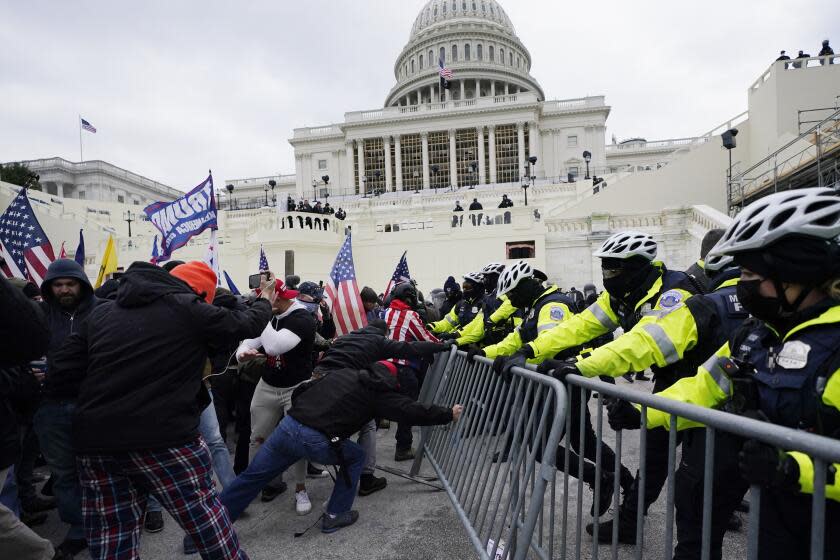Litman: A Supreme Court ruling may help Jan. 6 rioters. Here's why it's less likely to help Trump

For the record:
10:00 a.m. June 29, 2024: An earlier version of this article incorrectly indicated that Joseph Fischer could get “another trial.” Fischer has not been tried in the case.
The Supreme Court's decision in Fischer vs. United States, which came down among a bevy of blockbuster opinions Friday, was much anticipated for its potential impact on the prosecutions of hundreds of Jan. 6 rioters as well as former President Trump, who was charged under the same law. The court’s ruling was largely of a piece with the conservative justices' proclivity for narrowing criminal laws they perceive as imprecise and likely to trap the unwary. The majority opinion by Chief Justice John G. Roberts Jr. contends that the Justice Department's position on the obstruction statute at hand would “criminalize a broad swath of prosaic conduct.”
The decision is of course good news for Joseph Fischer, a Jan. 6 defendant who moved to dismiss one of the charges against him. Fischer barged into the Capitol on that day and was also charged with assaulting a federal officer, among other offenses. But the court held that he could not be charged under a federal law against obstructing an official proceeding for joining the melee that delayed the certification of the 2020 presidential election, ruling that the law is limited to conduct affecting the integrity or availability of records that could be evidence in an official proceeding.
Trump will certainly try to argue that the court's decision also requires dismissal of two counts against him under the same law in the federal Jan. 6 case. Many of the rioters were, like Fischer, charged under the statute and could benefit from the ruling as well. But the decision isn't likely to favor the majority of the marauders, and it's even less likely to help Trump.
Read more: Litman: This is Judge Aileen Cannon's big gamble in the Trump classified records case
In the case of the rioters, a study in Just Security persuasively suggests that even if the statute is unavailable to charge them in the wake of the Fischer decision, the government can still prosecute the same conduct in other ways.
The ruling probably won't be useful to Trump for another reason.
The lawyerly debate in Fischer comes down to the meaning of the word “otherwise." Following a section of the law that prohibits altering or mutilating a record, the law goes on to criminalize conduct that “otherwise obstructs, influences or impedes any official proceeding.“ The question is whether the law thereby applies to any obstruction of an official proceeding or only to acts that affect the integrity or availability of records to be used in the proceeding.
Read more: Litman: A jury was right to find Hunter Biden guilty. It's the prosecutor who was wrong
But Trump’s alleged conduct certainly affected the integrity or availability of records, namely the valid slates of presidential electors. His purported scheme was designed to undermine the legal impact of those slates and replace them with fraudulent certificates forged at the behest of his inner circle.
Justice Ketanji Brown Jackson’s concurring opinion in the case underscores this point. After endorsing the majority’s understanding of “otherwise,” she concludes that Fischer might still be charged under the statute because the “official proceeding” in question “plainly used certain records, documents, or objects — including, among others, those relating to the electoral votes themselves.”
Jackson’s hypothetical analysis concerns Fischer himself, but it seems she also means it to encompass the conduct of the former president. While Trump is not alleged to have destroyed or altered a document, he is alleged to have "otherwise" impaired the legal effectiveness of the certificates.
The dissenting opinion in the case, authored by Justice Amy Coney Barrett and joined by Justices Sonia Sotomayor and Elena Kagan, is an interesting postscript. Barrett argues that the government's reading of the text of the statute might be expansive but is in keeping with its plain meaning. The opinion is among those suggesting Barrett, a Trump appointee, is staking out the center of the court in certain important cases.
But the most pressing question raised by this decision and the presidential immunity opinion expected Monday is whether they will undermine the various criminal charges against the former president. The bottom line in this case is that it shouldn’t, and I don't think it will. Trump will surely move to dismiss the charges on this basis, but I expect U.S. District Judge Tanya Chutkan to reject that argument, which would allow the case to proceed as charged — unless, of course, the defendant returns to the White House and makes the entire prosecution go away.
Harry Litman is the host of the “Talking Feds” podcast and the Talking San Diego speaker series. @harrylitman
This story originally appeared in Los Angeles Times.


